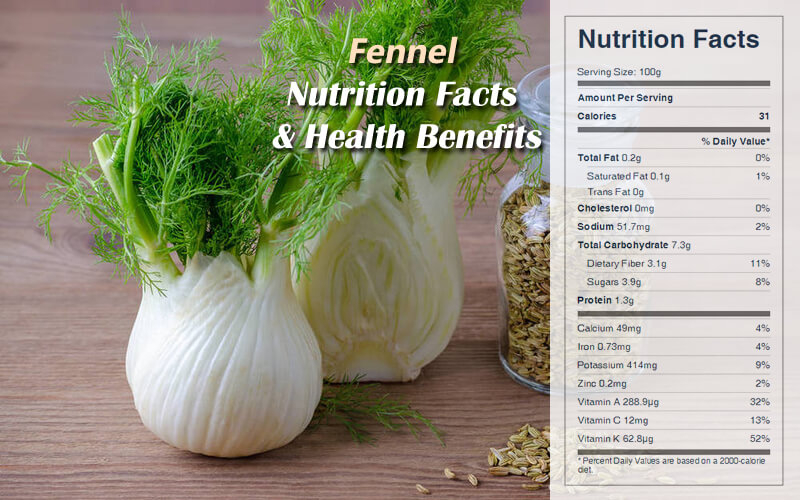Fennel Nutrition Facts & Health Benefits
Fennel is a popular vegetable, spice, and flavoring, as well as an ingredient in traditional medicines. It is one of the key flavorings in absinthe. Here are nutrition facts & health benefits of fennel.

Fennel Nutrition Facts Label
Health Benefits of Fennel
Fennel can be consumed daily through a variety of mechanisms. in the raw form as salads and snacks, or stewed, boiled, grilled, baked, or even boiled into herbal teas. Its benefits are attributed to its ability to modulate the immune system while providing anticancer, antibacterial, antioxidant, and anti-inflammatory effects.
Fennel has a positive effect on flatulence, irritable bowel syndrome, heartburn, and slow digestion. It’s typically recommended to drink fennel tea to reduce gas, but there is so much more to fennel.
Fennel contains 21 fatty acids, which play a significant role in reducing inflammation in the body. Remember, omega-3 fatty acids are considered antiinflammatory, while omega-6 fatty acids are proinflammatory. Although the precise ratio promoting inflammation is unknown, a ratio of omega-6 to omega-3 FAs greater than 10:1 is believed to be pro-inflammatory, which is likely tenfold higher than the ratio that humans evolved eating. The more omega-6 fatty acids (FAs) are consumed in the diet, the greater the chances for increased levels of inflammation.
Fennel also contains an abundant number of flavonoids (luteolin, quercetin, rutin, and isoquercitrin), which have immunomodulatory activities. Luteolin specifically has a broad range of anti-inflammatory benefits as well as anticancer, antibacterial, antioxidant, and immunomodulatory effects.
Because it also possesses some estrogenic properties, fennel is commonly used to promote increased milk production in women who are nursing, to promote menstruation, and to help with childbirth. But, since fennel’s phytoestrogen effects have not been thoroughly studied, women who are pregnant should avoid over-consumption of fennel or using it as a supplement. Too much fennel may lead to breathing problems or an irregular heartbeat.
Fennel contains an anise-flavored compound called anethole, which is a potent antimicrobial against bacteria, yeast, and fungi. It can serve as a digestive aid.
In many parts of east Asia, fennel seeds are consumed as an after-meal mouth freshener to remove bad breath.
storage
Look for good quality fennel with bulbs that are clean, firm, and solid, and without signs of splitting, bruising, or spotting. Fennel bulbs should be whitish or pale green in color. Choose stalks that are relatively straight and closely packed around the bulb. Stalks and leaves should be green in color. Stay away from any flowering buds, because this indicates that the vegetable is past maturity. Fresh fennel has a fragrant aroma, smelling subtly of licorice or anise.
Store fresh fennel in the refrigerator crisper, where it will stay fresh for about four days. It is best to consume fennel soon after purchasing, since it tends to lose flavor as it ages. Although fresh fennel can be blanched and frozen, it seems to lose much of its flavor during this process. If dried fennel seeds are stored in an airtight container in a cool, dry location, they will keep for about six months. They will stay fresh somewhat longer if stored in the refrigerator.